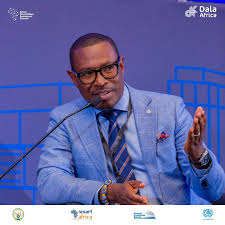Ghana’s 24-Hour Economy to Leverage Twin Financing Streams for Infrastructure and SME Support
The Director of Innovative Finance, Partnerships and Markets at the 24-Hour Economy Secretariat, Dr Ishmael Amanor Dodoo, has reiterated that the 24-hour economy initiative being championed by the Mahama-led government will be private sector-led, with government only providing the enabling environment for its implementation.
Speaking during the NorvanReports-Economic Governance Platform (EGP) X Space discussion themed “Beyond the Slogans: Will the 24-Hour Economy Fix Ghana’s Broken Systems?”, Dr Amanor Dodoo stressed that the initiative, contrary to popular assumptions, is not a government-run programme but one that will rely heavily on private capital and entrepreneurship.
“The 24-hour economy programme is actually private sector-driven,” stated Dr Amanor Dodoo. “As His Excellency President John Dramani Mahama said, government will create the enabling environment while the private sector leads in funding and execution.”
He added that the 24-hour economy has a clear and inclusive vision to catalyse industrialisation, promote exports, and create jobs around the clock. “It’s an economy that works for everyone every hour of the day,” he stressed.
Twin Financing Streams: Infrastructure and Enterprise Support
To operationalise the initiative, Dr Amanor Dodoo outlined two key financing streams: infrastructure financing and enterprise financing. The Ghana Infrastructure Investment Fund (GIIF) and the Development Bank Ghana (DBG) have been identified as lead partners in financing industrial parks and supporting small and medium enterprises (SMEs), respectively.
“We are looking to create Special Purpose Vehicles (SPVs) for private investors to finance agroecological parks and adjusted parks to support production and manufacturing,” he disclosed.
Target sectors for industrialisation include agriculture and agri-processing, pharmaceuticals, textiles and garments, construction, and metallurgical engineering. According to Dr Amanor Dodoo, enterprise financing will help SMEs secure “patient capital” and overcome access barriers such as collateral demands and short loan tenures.
“We’re addressing critical issues such as collateralisation, loan tenure, and equity build-up for SMEs to ensure sustainability,” he explained.
Market Demand and Competitive Labour Offerings
Highlighting Ghana’s market potential, Dr Amanor Dodoo pointed to an annual food import bill of US$2.4 billion and a textile industry that meets only 30% of national demand for 100 million yards of fabric. He also cited West Africa’s US$1.3 trillion market and 425 million-strong population as untapped opportunities for local production and exports.
“There’s already a guaranteed market—both domestically and across the sub-region—for private investors willing to participate,” he noted.
He further assured that competitive energy costs—estimated between 5 to 7 cents per kilowatt-hour—and Ghana’s relatively low labour costs (under US$10 per day) offer significant incentives for private sector investment. Comparatively, labour in the US and China costs between US$35 and US$40 per day.
“We also have an intelligent and youthful labour force that can be trained and deployed to meet industrial needs,” he said, describing Ghana as well-positioned to attract and retain productive capital.
Dr Amanor Dodoo’s remarks come amid growing debate over the viability of the 24-hour economy agenda. His emphasis on private sector leadership and the mobilisation of strategic financing mechanisms may offer clarity to sceptics while encouraging investor confidence.
“The private sector has everything it needs – energy, labour, markets and infrastructure – to release capital and drive production for export,” he remarked.








